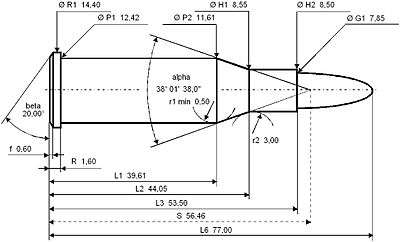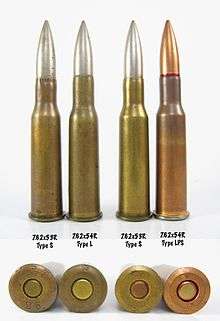7.62×53mmR
| 7.62×53mmR | ||||||||
|---|---|---|---|---|---|---|---|---|
|
7.62×53mmR cartridges | ||||||||
| Type | Rifle | |||||||
| Place of origin |
| |||||||
| Service history | ||||||||
| In service | 1918 to present | |||||||
| Used by | Finland | |||||||
| Production history | ||||||||
| Designed | 1918 | |||||||
| Produced | 1918 to present | |||||||
| Specifications | ||||||||
| Parent case | 7.62×54mmR | |||||||
| Case type | Rimmed, necked | |||||||
| Bullet diameter | 7.85 mm (0.309 in) | |||||||
| Neck diameter | 8.55 mm (0.337 in) | |||||||
| Shoulder diameter | 11.61 mm (0.457 in) | |||||||
| Base diameter | 12.42 mm (0.489 in) | |||||||
| Rim diameter | 14.40 mm (0.567 in) | |||||||
| Rim thickness | 1.60 mm (0.063 in) | |||||||
| Case length | 53.50 mm (2.106 in) | |||||||
| Overall length | 77.00 mm (3.031 in) | |||||||
| Case capacity | 4.16 cm3 (64.2 gr H2O) | |||||||
| Rifling twist | 300 mm (1 in 11.81 in) | |||||||
| Primer type | Berdan | |||||||
| Maximum pressure | 390.00 MPa (56,565 psi) | |||||||
| Ballistic performance | ||||||||
| ||||||||
The 7.62×53mmR (also known as the 7.62×53mmR Finnish) rifle cartridge is a Finnish design based on the Russian 7.62×54mmR round dating back to 1891.
History
After gaining its independence in 1917 and after the Finnish Civil War of 1918, large numbers of Model 1891 Mosin–Nagant rifles were in the hands of the Finnish military. As the old barrels were worn out, they were replaced by new 7.83 mm (.308 in) barrels and the leftover 7.62×54mmR cartridges being in short supply, a domestic product was needed. This gave birth to the 7.62×53mmR.
In the late 1930s the Finnish Army started loading military cartridges with domestically produced 7.87 mm (.310 in) diameter D166 bullets as the production of new M39 "Ukko-Pekka" rifles barreled for 7.62×54R diameter bullets started. This change was due in part to allow the use of captured Soviet ammunition and machine gun ammunition which often was of a slightly greater bore diameter than its Finnish counterparts. The rifling twist rate was also changed from 300 mm (1 in 11.81 in) to 254 mm (1 in 10 in).[1]
The 7.62×53mmR cartridge remains in military use to this day, although it is now only used by the 7.62 TKIV 85 sniper rifle. PKM machine guns and other Russian weapons in use by the Finnish Defence Forces use the 7.62×54mmR exclusively. The Finnish Defence Forces issued instructions that when ever possible, personnel issued with a rifle chambered for 7.62×53mmR (effectively the TKIV 85 rifle) should use 7.62×53mmR ammunition only, and that use of 7.62×54mmR is only allowed when 7.62×53mmR is not available.
Cartridge dimensions
The 7.62×53mmR has 4.16 ml (64 grains) H2O cartridge case capacity. The exterior shape of the case was designed to promote reliable case feeding and extraction in bolt action rifles and machine guns alike, under extreme conditions.

7.62×53mmR maximum C.I.P. cartridge dimensions.All sizes in millimeters (mm).
Americans would define the shoulder angle at alpha/2 ≈ 18.5 degrees. The common rifling twist rate for this cartridge is 300 mm (1 in 11.81 in), 4 grooves, Ø lands = 7.59 mm, Ø grooves = 7.83 mm, land width = 4.20 mm and the primer type is Berdan or very rarely large rifle.
According to the official C.I.P. (Commission Internationale Permanente pour l'Epreuve des Armes à Feu Portatives) guidelines the 7.62 × 53 R case can handle up to 390 MPa (56,564 psi) piezo pressure. In C.I.P. regulated countries every rifle cartridge combo has to be proofed at 125% of this maximum C.I.P. pressure to certify for sale to consumers.
Differences between 7.62×53mmR (Finland) and 7.62×54mmR (Russia)

- Round length: 77.00 mm (54R: 77.16)
- Case length: 53.50 mm (54R: 53.72)
- Rim diameter: 14.40 mm (54R: 14.48)
- Bullet diameter: 7.85 mm (54R: 7.92)
The 7.62×53mmR is practically interchangeable with the 7.62×54mmR, the 54R will fit into the smallest allowed chamber size for the 53R, but is nevertheless a different cartridge made to different C.I.P. standards. Using military steel-jacketed 54R Russian ammunition in weapons made for 53R is not recommended (except the M39 and 7.62 TKIV 85 rifles designed to allow safe use of 54R in case of emergency), as it may rapidly wear out the barrel. Even worse, there is a possibility that the resulting pressure from the steel-jacketed larger diameter bullet is too much and firing it may result in severe damage to both the rifle and the shooter. Using the 53R in a gun made for the 54R is however safe, although it may result in accuracy well below the weapon's potential.
The Finnish commercial ammunition manufacturer Lapua does not make a difference between the 53R and 54R, but produces cartridges that will function in weapons chambered for either one.
The Russian ammunition maker Barnaul states that Russian cartridges marked 7.62×53 are the same as 7.62×54. From their web site: "Some hunters have been confused because there have been varying marking on the package, case bottom and stamps: 7.62×53: 7.62×53R: 7.62×54: 7.52×54R. This happened because the 53.72 mm case length was rounded off differently in various countries. After Russia became a member of the European Permanent Coordinated Commission, the final name - "7.62×54R" - of the cartridge was accepted. "[2]
Additionally, Russian ammunition manufacturer LVE (Novosibirsk Cartridge Plant) states, "The cartridges cal.7,62×54R are produced by various producers around the world. Producers mark these cartridges differently, and this leads to confusion among the customers – 7.62х53; 7.62×53R; 7.62х54; 7.62×54R. The confusion is based on difference in rounding out (rounding up or rounding down) the case length (case length of our cartridges is 53.65-0.2 mm). The letter "R" indicates a case rim. After Russia’s joining European Commission (ПМК) a definite name of this cartridge was determined – 7,62×54R. Therefore, you may use cartridges of caliber 7.62х54R freely with your arms [marked as 7.62×53R]."[3]
See also
- 7.62 mm caliber
- Dragunov SVD
- Mosin–Nagant
- Degtyerev DP-28
- PK machine gun
- Russian M1910 Maxim
- 7.62 Tkiv 85
References
- ↑ Finnish Model 1939 (M39) Service Rifle
- ↑ http://www.barnaul.co.nz/index.php?page=jsc-barnaul-machine-tool-plant
- ↑ Novosibirsk Cartridge Plant
- C.I.P. CD-ROM edition 2003
- C.I.P. decisions, texts and tables (free current C.I.P. CD-ROM version download (ZIP and RAR format))
External links
- An evaluation list for variants, weights, and velocities of this ammunition type
- A dimensional diagram of the cartridge
- A description of the cartridge at Chuckhawks.com
- A guide to headstamps and bullet types at Mosinnagant.net
- C.I.P. TDCC sheet 7.62 × 53 R (legally binding dimensions and data for civilian use in Finland)